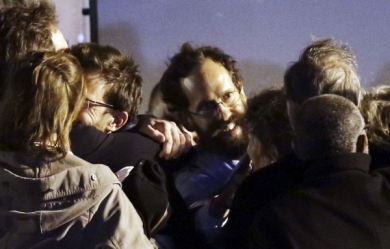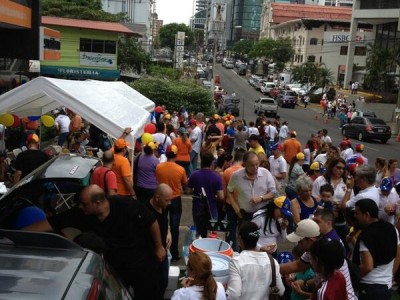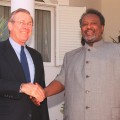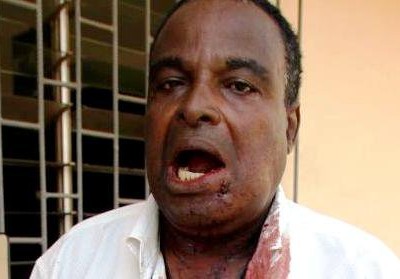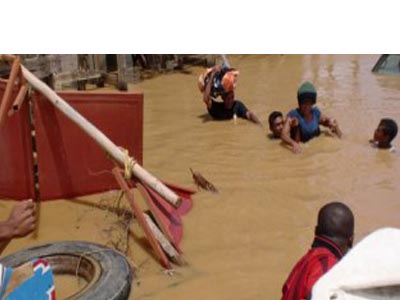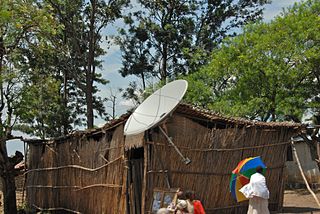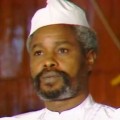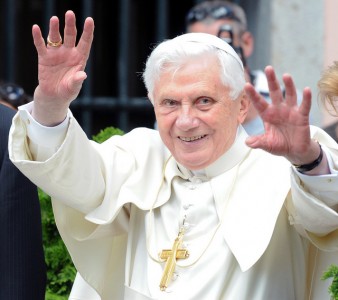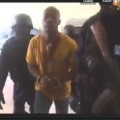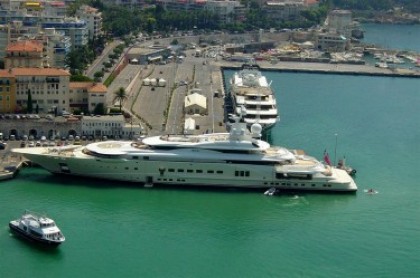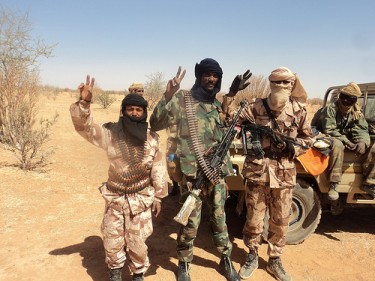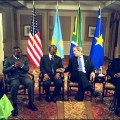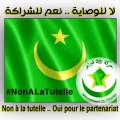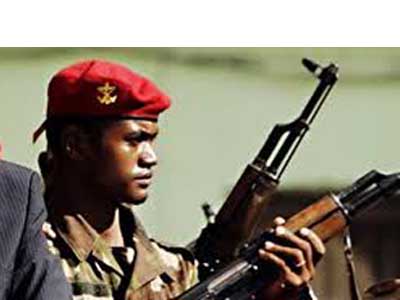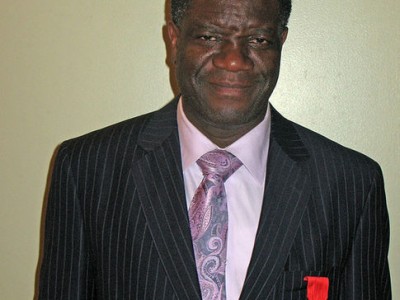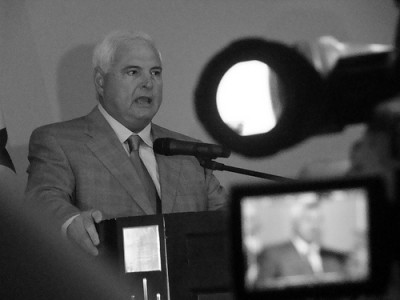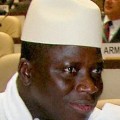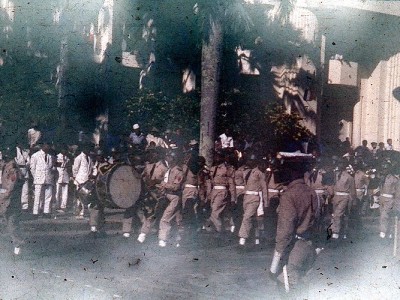Latest posts by Jane Ellis
Côte d'Ivoire: Opinions on Marriage for all
France’s adoption of the ‘Marriage for All’ bill has given rise to incomprehension, sometimes with a jokey tone, in Francophone Africa, Here, we look at opinions of commentators from the Côte d'Ivoire.
Hostages and Ransom Payments: What is France's Policy?
Around three months after the French President François Hollande’s January 2013 decision to stop paying ransoms to hostage takers, the Moulin-Fournier family were finally released, to the immense relief of their family and friends. The exact circumstances behind their liberation have not been disclosed, leading many to wonder whether money was used to secure their release, and, if so, what this says about France's policy towards hostage takers.
Majority of Venezuelans in Panama Vote for Opposition Candidate Capriles
Venezuelans resident in Panama attended polls to vote in the Venezuelan elections on April 14, 2013. Upon learning of the results, a group of supporters of opposition candidate Henrique Capriles broke into the Embassy of Venezuela in Panama.
Djibouti: Arrests follow ‘Democratic’ Elections
Several opposition leaders were arrested in Djibouti after demonstrations which followed the February 22, 2013 general elections. The elections saw yet another victory for the party in power, the People's Rally for Progress. President Ismail Omar Guelleh, who has ruled since 1999, received 80% of votes cast, leading to allegations of fraud on a massive scale. Arrests were still continuing at the time of writing, April 2013.
Tear Gas and Rubber Bullets Break Journalist Protest in Togo
On March 14, 2013, security forces violently broke up a sit-in by private sector journalists in Togo. The journalists were protesting the new dispositions of the Organic Law which mean business licences of the Togolese media can now be withdrawn without judicial proceedings. The protests against the law of the High Audiovisual and Communications Authority (HAAC) took place in Lomé, largest city and capital of Togo. Security forces used clubs, tear gas bombs and rubber bullets to disperse demonstrations resulting in several journalists being injured.
Cyclone Haruna Kills 23 and leaves 22,000 Homeless in Madagascar
Cyclone Haruna has caused a total of 23 deaths, as well as 16 missing persons, 84 people injured and nearly 22,000 disaster victims, during just one week of February 2013 in Madagascar. Despite the images of distress and messages from humanitarian organisations requesting urgent help, some feel that solidarity has been slow be felt in the affected region, the South West of Madagascar. However, many associations and agencies have rallied round in Madagascar and abroad to come to the region’s assistance.
Burundi: Violent Suppression of Demonstration Support for Imprisoned Journalist
The Court of Burundi revised the life sentence for journalist and Radio France International correspondent Hassan Ruvakuki on appeal, reducing his sentence to three years imprisonment. Media professionals demonstrated in sympathy weekly outside the Bujumbura Court building since the sentence was handed down until violent suppression of a march by the authorities.
A First for Africa: Ex-Dictator to be Judged on the Continent
A new court system, the Extraordinary African Chambers has recently been set up to allow the first ever trial of one of its own dictators on the continent. The tribunal to judge Hissène Habré, former president of Chad, opened in Senegal on February 8, 2013. Human Rights Watch has been working since 1999 with victims of the ex-dictator, currently in exile in Senegal, in order to bring him to justice.
Pope’s Resignation Echoes in Africa
The announcement by Pope Benedict XVI of his intention to resign with effect from February 28, 2013 provoked many reactions in Francophone Africa, both in traditional media and on social networks. Admiration for the Pope predominated, and was combined with the desire that certain African leaders would follow his example.
Open Access and the Complexity of Digital Rights
How do ways of thinking change through time and space? Today, this problem concerning the way the human intellect works is compounded by a new method of transmission - digital. Open Access are calling for free availabilty of digitised publications from publicly-funded scientific research.
Côte d'Ivoire: Charles Blé Goudé Charged with War Crimes
After his arrest in Ghana, Charles Blé Goudé, nicknamed ‘Street General’ and close associate of former president Laurent Gbagbo, was charged with war crimes on January 21, 2013. His arrest caused great debate in the Ivorian blogosphere as it happened against a backdrop of national reconciliation in Côte d'Ivoire.
Petrodollars, Megalomania and Human Rights in Equatorial Guinea
President Teodoro Obiang Nguema Mbasogo of Equatorial Guinea launched a charm offensive in 2011 and 2012 using his petrodollars to target the worlds of showbusiness, sport and international diplomacy. However, following his accession to chairmanship of the African Union, the civil society denounced him for his poor human rights record while the orgy of spending conducted by his son caused widespread revulsion.
2012: A Year of Revolt and Social Change in Francophone Countries: Part 1 of 2
The year 2012 was marked by armed conflicts in Mali, the Democratic Republic of Congo and the Central African Republic. There were elections in Senegal, Quebec and France, while demonstrations for change took place in Chad, Madagascar and Togo. Debates raged on issues such as immigration, the economic crisis and equality in marriage laws. This is the first part of a review of the year 2012 in Francophone countries.
A Timeline of 50 Years of Conflict in the D.R. of Congo
The ongoing conflict between M23 rebels and the Congolese army cannot be totally understood without some historical background on the genesis of these conflicts in the great lakes region. Here is a detailed chronology of the last 50 years of confrontations in this region.
Mauritania: February 25th Movement says “No to Guardianship” of France
Mauritania is undergoing a period of great political uncertainty due to the evacuation for medical reasons of President Mohamed Ould Abdel Aziz after he was shot on October 13, 2012. While Mauritania was preparing for his return, many citizens were left wondering what political role France would play in the current situation.
What is the Role of the Army in Africa Today?
The army has often played a determining but ambiguous role in the African political process. Between 1950 and 2000, 53 African countries were subject to military coups leading to regime change. After a period of respite in the 1990’s, the African continent was once again the scene of many military coups in the first decade of the 21st century, with 27 attempts at takeover. Being both a factor in the consolidation and the destabilisation of regimes, the army is regarded with suspicion in most countries and does not seem to know how to adapt to changing mindsets.
A New Start for Barack Obama in Africa?
Following the November 6, 2012, re-election of Barack Obama as President of the United States, Africa questions his legacy after four years in charge of an America more concerned with the economic crisis than by its international relations, especially those within the African continent. The expectations of Africans were high, however many believe that a second term for Obama will allow him greater manouevrability on African issues.
D. R. of Congo: Human Rights Activist Assaulted, Guard Killed
Leading Human Rights Activist and gynecologist Denis Mukwege, was attacked outside his home, and his guard killed on October 25, 2012. Doctor Mukwege has campaigned tirelessly for the wellbeing of women and girls affected by the use of mass rape as a weapon of war. He recently gave a speech to the United Nations where he spoke of his outrage and shock at the violence that females have suffered in his homeland.
President Martinelli Addresses Panama After Repealing Law 72
President Martinelli of Panama gave a conciliatory speech to try and draw a close to a chaotic week which has left four people dead and many injured as they demonstrated against Law 72. The law authorising sale of land in the Free Zone of Colon was finally repealed. Reactions to the speech on Twitter were many and varied.
Gambia: Dramatic Increase in Executions
Nine prisoners were put to death on one day in August 2012. The sudden increase in capital punishment over the last few months as well as confusing declarations from President Jammeh have worried citizens of Gambia as well as those in neighbouring countries. The death penalty was abolished in 1993 but reinstated by Yahya Jammeh one year after the coup of July 1994.
Madagascar: Preserving National Heritage with Video Archiving
A Civil Society Initiative has been set up to preserve the 'collective memory' of Madagascar by digitally archiving videos detailing its, often controversial, history. The Fl@H Association was set up to preserve Madagascar’s audiovideo heritage and aims to be a force for the preservation of the country’s history. Members can already point to several achievements.

